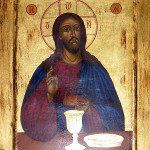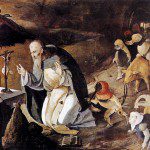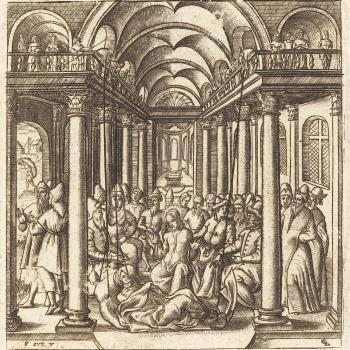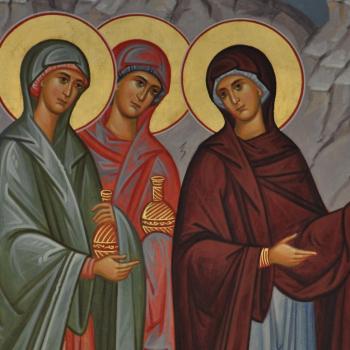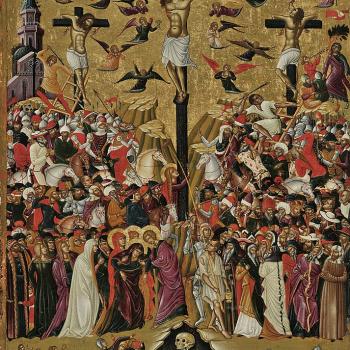This is the second post on a series exploring the eucharist. Click here for part one.
![The Last Supper. Țetcu Mircea Rareș [CC BY-SA 2.5 (http://creativecommons.org/licenses/by-sa/2.5)], via Wikimedia Commons](https://wp-media.patheos.com/blogs/sites/637/2017/07/Romania_Mures_Urisiu_de_Jos_last_supper_icon_91-300x180.jpg)
Now as they were eating, Jesus took bread, and blessed, and broke it, and gave it to the disciples and said, “Take, eat; this is my body.” And he took a cup, and when he had given thanks he gave it to them, saying, “Drink of it, all of you; for this is my blood of the[c] covenant, which is poured out for many for the forgiveness of sins. I tell you I shall not drink again of this fruit of the vine until that day when I drink it new with you in my Father’s kingdom” (Matt. 26:26-29 RSV).
Paul, likewise, said that this was revealed to him by Jesus so that he could and would continue with the celebration of the eucharist:
For I received from the Lord what I also delivered to you, that the Lord Jesus on the night when he was betrayed took bread, and when he had given thanks, he broke it, and said, “This is my body which is for you. Do this in remembrance of me.” In the same way also the cup, after supper, saying, “This cup is the new covenant in my blood. Do this, as often as you drink it, in remembrance of me.” For as often as you eat this bread and drink the cup, you proclaim the Lord’s death until he comes (1 Cor. 11:23 – 26 RSV).
The action, the liturgical action, is done as a ritual to truly remember the paschal sacrifice of the lamb of God. Ritual memory seeks to establish union with what is remembered; it is not just some thoughtful recollection of the past, but it is a re-establishment of that event in time, so that it can be experienced again and again. The Israelites remembered the Passover, and in doing so, found themselves participating in it, slaying and eating of the Passover sacrifice so that they can unite with all who participate in the Passover and experience the grace and miracle of Passover itself. Likewise, the fulfillment of Passover is established by Jesus. He is the lamb of God slain from the foundation of the world, and so he is the eternal Paschal sacrifice; he is slain and given to all humanity to eat, just as the Passover lamb was slain and given to the people of Israel. He is slain, and we now eat of the lamb of God and hopefully find ourselves saved from the wrath of God which is to come. We receive what was given at the Last Supper, the gift of Christ himself, so that we might live. What is offered, therefore, is nothing ordinary but the actual presence of Christ; we are called to receive in the right spirit, lest we find ourselves risking God’s judgment:
Whoever, therefore, eats the bread or drinks the cup of the Lord in an unworthy manner will be guilty of profaning the body and blood of the Lord. Let a man examine himself, and so eat of the bread and drink of the cup. For any one who eats and drinks without discerning the body eats and drinks judgment upon himself (1 Cor. 11:27 – 29 RSV).
Paul affirms that what is given is truly the body and blood of the Lord, for what is given can be profaned; if they were mere bread and wine, it would be difficult to understand how someone could “eat and drink” judgment upon themselves, for there would not even be the temptation of gluttony involved with such a miniscule amount of food.
Holy things are for the holy; those who feel that they have something which keeps them away from the altar should not partake of the eucharist until their conscience is clear lest they receive Christ with an ill spirit which is not open to him and the transformation which Christ brings. This is what can and will hinder them more, for Christ gives to them his power and grace, but they use it to reinforce their sinful self instead of to be transformed by him into a full-fledged member of his body, and so they truly harm themselves with the grace which they have been given. But if they eat worthily, which is not the same as being sinless per se (since we all sin), they receive Christ and find his presence in them so that he can work in them and bring him into himself. Sin can turn us inward, away from God, closing ourselves off from grace; great sin is among those things which can and should limit our reception of communion until we cleanse our conscience of it; yet, we must remember, communion is for our eternal life, and so it is also received for the forgiveness of sins; not all sin cuts us from communion, only grave kinds which make our conscience scream, will turn the grace against its purpose and turn us further away from Christ. If we go to penance, if we purify ourselves from the unwholesome fruit of our actions, we will find our spirit is once again opened for the transformative grace of communion and so should be free to partake.[1]
It is a union with Christ, with the mystical body of Christ, which is established in the proper reception of communion. Though we are incorporated into the body of Christ, we are not absorbed into his person, into his hypostasis, becoming who and what he is in his person — rather, it is by grace we are incorporated into him and lifted up beyond ourselves while remaining persons in him, so that we are by grace what he is by nature. There is no confusion between us and the person of Christ, and yet by receiving his body and blood in the form which he established at the Last Supper, we open ourselves up to him, to his watchful eye, which is also why it can be said to be put us into judgment. For Christ judges, purifies, and raises up all who open themselves to him. Those who come to him, closed off in sin, unwilling to open themselves up and be purified, and so remain in their sin, the purification he offers is rejected and so it comes to us in the form of judgment. Thus, to dishonor the sacrament through such reception is what brings Jesus’ critical response, as St. Bonaventure explained:
Hence the recipient does not transform Christ into himself but rather is himself translated into Christ’s mystical body. For this reason it is quite evident that he who receives in a lukewarm manner, without devotion and inconsiderately, eats and drinks judgment until himself, because he brings dishonor to such a great sacrament. [2]
Christ, therefore, gave us the sacrament, using bread and wine as the material foundation by which he would offer us himself. For bread and wine are basic forms of food and drink, and we need a food and drink which nourishes us not only in body but also in soul. He used what we knew and recognized as food and used it to give himself to us. He allowed the external, physical form of bread and wine to remain while transforming their essence to himself, so that it remains easily received by those coming to receive communion.[3] He knew we needed to receive him in a form which we could understand so that we could receive the grace in a mystery which should awe us as it transcends our comprehension. St. John of Damascus, therefore, said Christ worked with basic material forms as signs by which we can encounter a reality which is hidden in those signs:
Further, bread and wine are employed: for God knows man’s infirmity: for in general man turns away discontentedly from what is not well-worn by custom: and so with His usual indulgence He performs His supernatural works through familiar objects: and just as, in the case of baptism, since it is man’s custom to wash himself with water and anoint himself with oil, He connected the grace of the Spirit with the oil and the water and made it the water of regeneration, in like manner since it is man’s custom to eat and to drink water and wine , He connected His divinity with these and made them His body and blood in order that we may rise to what is supernatural through what is familiar and natural.[4]
[1] Likewise, in extraordinary circumstances where we cannot receive penance, it might possible to receive, so long as we incline ourselves to God, asking for forgiveness, freeing ourselves and our conscience from the sin with the firm intention of confession as soon as is possible.
[2] St. Bonaventure, Breviloquium. Trans. Erwin Esser Nemmers (St. Louis, MO: B. Herder, 1946) 200.
[3] The bread can be leavened or unleavened; but it has to be bread and not some imitation which is not bread, just as Jesus was truly man and not some docetical imitation of man.
[4] St. John of Damascus, “On the Orthodox Faith” in NPNF2(9): 83.
Stay in touch! Like A Little Bit of Nothing on Facebook:
A Little Bit of Nothing


